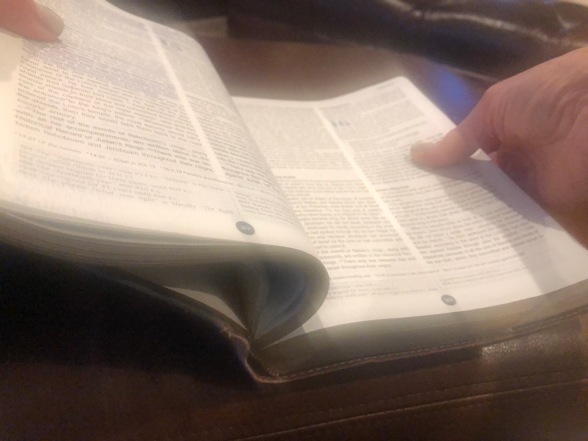Do you have a Biblical World-view?
If you’re a Christian, maybe you just assume that you do, and have never given it too much thought. Or, maybe you’re not even sure what a “Biblical” world-view is and why having one would be so important anyway.
A worldview is the paradigm or grid through which we see and evaluate the world and everything that happens to us. It’s like a pair glasses we wear that colors what we see and how we perceive it. In his book, “Think Like Jesus”, George Barna defines a Biblical worldview like this: “A Biblical worldview is thinking like Jesus. It is a way of making our faith practical to every situation we face each day. A Biblical worldview is a way of dealing with the world such that we ACT like Jesus twenty-four hours a day because we THINK like Jesus...It’s like having a pair of special eyeglasses we wear that enables us to see things differently, to see things from GOD’s point of view, and to respond to those perceptions in the way He would prescribe if He were to provide us with direct and personal revelation.”
Shockingly, in his 2021 research survey, George discovered that only 9% of born again Christians have a Biblical worldview.
Barna said, “For the purposes of the research, a biblical worldview was defined as believing that absolute moral truths exist; that such truth is defined by the Bible; and firm belief in six specific religious views.
Those views were
- that Jesus Christ lived a sinless life;
- God is the all-powerful and all-knowing Creator of the universe and He stills rules it today;
- salvation is a gift from God and cannot be earned;
- Satan is real;
- a Christian has a responsibility to share their faith in Christ with other people;
- and the Bible is accurate in all of its teachings.”
In his book “Scripture Twisting”, James W. Sire identifies twenty common ways the Bible is twisted and misread, and he describes World-view confusion as “the most fundamental misreading of all.”
Read the excerpts below from chapter 9 in his book, which he titles, “World-View Confusion: The Heart of the Matter”.
~~~~~~~~~~~~~~~
“We come finally to the most fundamental misreading of all. Or rather, we return to it…World-view confusion is either the major cause or the major result of all other reading errors. For what is at stake is the overall pattern of meaning that distinguishes one cult from another, one religion from another, one world view from another.
Misreading No. 20: World-View Confusion
World-view confusion occurs whenever a reader of Scripture fails to interpret the Bible within the intellectual and broadly cultural framework of the Bible itself but uses instead a foreign frame of reference.
The usual way in which it appears is for scriptural statements, stories, commands or symbols which have a particular meaning or set of related meanings within the Biblical frame of reference to be lifted out and placed within another frame of reference.
The result is that the original, intended meaning is lost or distorted, and a new and quite different meaning is substituted.
Here, I think, is the key to understanding world-view confusion: Instead of yielding to the intentions of the Bible, the reader simply searches for elements that superficially seem to agree with his preconceived notion; after finding those elements, the reader extracts them from their context and places them in his own.
Responsible readers, on the other hand, are humble readers. They give up their own ambition to find in Scripture what they want to find. They bow before the meaning system they are dealing with. They say to Scripture and God who stands behind it, ‘What do you mean? What are you saying? Teach me. If I understood You yesterday, confirm that to me today. If I misunderstood You yesterday, correct me today.'”
~~~~~~~~~~
Will you commit to studying the Word of God in its entirety, using sound exegesis so that you will “NOT be conformed to this age, but be TRANSFORMED by the renewing of your mind, so that you may DISCERN what is the good, pleasing, and perfect will of God.” (Romans 12:2)
Will you “BE CAREFUL so that no one takes you captive through philosophy and empty deceit based on human tradition, based on the elemental forces of the world, and not based on Christ.” (Colossians 2:8)
Will you make prayer a priority, and allow Jesus to shape your worldview?
As Paul warned the Church in Ephesus, “I know that after I leave, savage wolves will come in among you and will not spare the flock. EVEN FROM YOUR OWN NUMBER men will arise and DISTORT THE TRUTH in order to draw away disciples after them. So BE ON YOUR GUARD!”







